#Korean Vocabulary
Explore tagged Tumblr posts
Text
Korean Emotions (part 1)
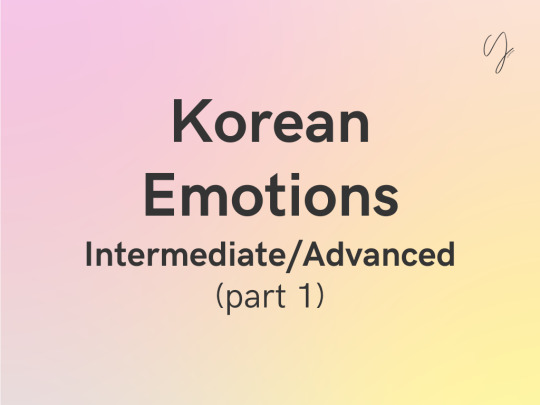
가뜬하다 (adj.) : refreshed; light-hearted 몸이나 마음이 가볍고 상쾌하다. Body or mind being light and refreshed. 예.) 가:너 오늘 기분이 굉장히 ���아 보인다? 나:과제를 다 끝냈더니 마음이 가뜬한 게 날아갈 것 같아.
가련하다 (adj.) : pitiful; poor; pathetic 마음이 아플 정도로 불쌍하다. Sadly sick or troubled. 예.) 직장에서 해고를 당하고 집에서 놀고 있는 형이 매우 가련하다.
가소롭다 (adj.) : ridiculous; absurd 비웃고 무시할 만하다. Deserving to be belittled and ignored. 예.) 형은 내 말을 형편없고 가소롭다는 듯이 들은 척도 안 했다.
가엾다 (adj.) : feeling pity 마음이 아플 정도로 불쌍하고 딱하다. Feeling heartfelt pity or sympathy for someone. 예.) 나는 자식들을 먹여 살리느라 평생을 고생하신 어머니가 가엾게 느껴졌다.
가증스럽다 (adj.) : despicable; detestable 다른 사람의 말이나 행동이 화가 날 정도로 몹시 밉다. Behavior or a remark being mean or hypocritical enough to upset others. 예.) 승규는 남들 앞에서만 착한 척하는 지수의 행동이 가증스러웠다.
가책 (n.) : admonishment; rebuke 자기나 남의 잘못을 꾸짖음. The act of scolding oneself or others for doing something wrong. 예.) 나는 친구를 속이고 한동안 심한 죄책감과 가책에 시달렸다.
갈등하다 (v.) : be ambivalent 마음속에서 어떻게 할지 결정을 못 한 채 괴로워하다. To experience agony and inner struggle over what to decide. 예.) 나는 시험 준비를 할까 좋아하는 드라마를 볼까 한참을 갈등했다.
감개 (n.) : deep emotion 지난 일이 생각나서 마음속에서 솟아오르는 감동이나 느낌. One's state of feeling deeply moved and getting emotional from one's memory of past events. 예.) 작가는 몇 년 동안 고생하면서 쓴 소설이 출판된 것을 보고 깊은 감개에 젖었다.
감개무량하다 (adj.) : touched deeply; emotional 지난 일이 생각나서 마음속에서 느끼는 감동이 매우 크다. Feeling deeply moved and getting emotional from one's memory of past events. 예.) 상을 받은 여배우는 감개무량한 표정으로 소감을 이야기했다.
감격하다 (v.) : be touched 마음에 깊이 느끼어 매우 감동하다. To be deeply moved and touched by someone or something. 예.) 대회에서 일 등을 ��� 선수는 감격한 표정으로 소감을 말하였다.
감동하다 (v.) : be moved; be touched 강하게 느껴 마음이 움직이다. To be touched by something very deeply. 예.) 나는 어려운 환경에서도 꿈을 잃지 않고 살아가는 청년의 이야기를 듣고 무척 감동했다.
감명 (n.) : impression 잊을 수 없는 큰 감동을 느낌. 또는 그런 감동. A state of being deeply touched, or such a feeling. 예.) 지수는 가족의 사랑을 그린 영화를 보고 감명을 받아 눈물을 흘렸다.
감미롭다 (adj.) : mellow; sweet 달콤한 느낌이 있다. A story, voice, song, etc., sounding sweet. 예.) 김 감독은 사랑에 빠진 남녀의 행복하고 감미로운 사랑 이야기를 영화로 만들었다.
감복하다 (v.) : be impressed; be moved 진심으로 크게 감동하다. To be impressed deeply and sincerely. 예.) 공연이 끝난 후 관객들은 배우들의 훌륭한 연기에 감복해 박수를 쳤다.
감탄하다 (v.) : admire; wonder 마음속 깊이 크게 느끼다. To feel strongly and deeply about something. 예.) 관객들은 서커스 단원의 공중 묘기에 감탄하여 박수를 쳤다.
감회 (n.) : reminiscence 마음속에 일어나는 지난 일에 대한 생각이나 느낌. Thoughts or feelings on the past. 예.) 아버지는 돌아가신 할머니의 사진을 보며 감회에 젖으셨다.
개탄하다 (v.) : deplore; lament 분하거나 안타깝게 여겨 탄식하다. To sigh at something out of anger or regret. 예.) 나는 경솔한 말 한마디로 사랑하는 여자를 떠나보낸 뒤 자신이 어리석었다고 개탄했다.
거부감 (n.) : sense of refusal 어떤 것을 받아들이고 싶지 않은 느낌. The feeling of not wanting to accept something. 예.) 이 책은 고전을 청소년들의 눈높이에 알맞게 개작하여 그들이 거부감을 갖지 않고 쉽게 읽을 수 있다.
걱정하다 (v.) : worry; be worried; be concerned 좋지 않은 일이 있을까 봐 두려워하고 불안해하다. To feel fearful and anxious that something bad might happen. 예.) 그는 다가올 시험에 대해 항상 걱정했다.
겁나다 (v.) : be afraid; be scared 무서워하거나 두려워하는 마음이 들다. To feel afraid or scared of something. 예.) 나는 교통사고를 당한 이후 차 타는 것이 겁난다.
격노하다 (v.) : be furious; be enraged 몹시 화를 내다. To be extremely angry. 예.) 강제로 해고된 직원들이 회사에 격노하여 복직을 요구하는 시위를 벌였다.
격분하다 (v.) : be furious; be enraged 몹시 화를 내다. To be extremely angry. 예.) 사기 피해자들이 격분하여 사기꾼의 멱살을 잡고 분통을 터뜨렸다.
격정 (n.) : passion 강렬하고 갑자기 생기는 참기 어려운 감정. A powerful, sudden burst of uncontrollable emotion. 예.) 나는 알 수 없는 격정으로 가슴이 꽉 막히는 것 같았다.
겸연쩍다 (adj.) : embarrassed; abashed; sheepish; awkward 쑥스럽거나 미안하여 어색하다. Awkward due to being shy or sorry. 예.) 나는 짝사랑했던 그를 마주 대하기가 겸연쩍어 자리를 옮겼다.
sources:
KOR-EN Basic Korean Dictionary through Naver Dictionary. National Institute of Korean Language. Accessed 14 July 2024. <https://en.dict.naver.com/#/main>.
Park, In-Jo., & Min, Kyung-Hwan (2005). Making a List of Korean Emotion Terms and Exploring Dimensions Underlying Them. Korean Journal of Social and Personality Psychology, 19(1), 109-129.
#한국어#한국어 공부#공부계#한국어 공부하기#한국어 배우기#korean#learning korean#study korean#studyblr#new vocab#korean learning#learning#learn english#learnlanguages#learnsomethingneweveryday#english#english language#language stuff#korean vocabulary#korean language#korean english
75 notes
·
View notes
Text
한국 전래동화에 나오는 어회와 문법 ! - Vocabulary and grammar in traditional Korean fairytales !
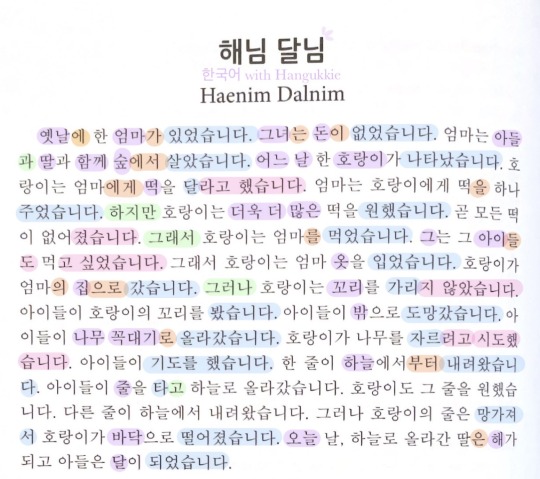
English Translation:
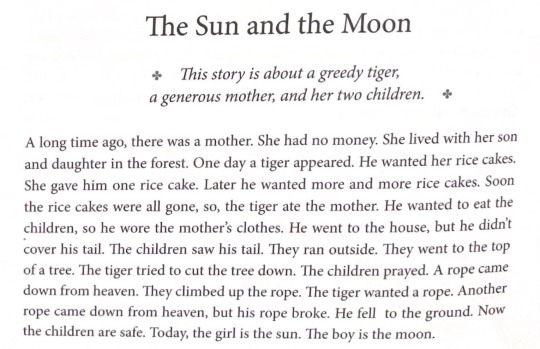
———————————————————
Vocabulary:
옛날 - Olden days
옛날에 - Once upon a time
어머니/엄마 - Mum
그녀 - She/Her
돈 - Money
아들 - Son
딸 - Daughter
함께 - Together
숲 - Forest
어느 - Which
날 - Day
호랑이 - Tiger
떡 - Rice cake
더욱 더 - More and more
많이/많은 - Many/A lot
그 - He/Him
아이 - Kid/Child
아이들 - Kids/Children
옷 - Clothes
집 - House
꼬리 - Tail
밖 - Outside
나무 - Tree
꼭대기 - The top
하늘 - Sky
줄 - Rope
바닥 - Floor
오늘 - Today
해 - Sun
달 - Moon
Grammar - Verbs:
있다 - To exist
없다 - To not exist
살다 - To live
나타나다 - To appear
달다 - To ask/To request (In this context)
주다 - To give
원하다 - To want/To wish/To desire
먹다 - To eat
가다 - To go
가리다 - To cover
보다 - To see
도망가다 - To run away
올라가다 - To go up
자르다 - To cut
기도를 하다 - To pray
내리다 - To get off
떨어지다 - To fall
된다 - To become
Grammar - Sentence Forms:
라고 하다 - For indirect quotations
지다 - To become
도 - Too/Also/As well as
고 싶다 - To want
지 않다 - Is not
려고 - To intend to
시도하다 - To attempt to
Grammar - Connectives:
과 - And/With (With 받침)
하지만 - But
���래서 - So
그러나 - But/However
하고 (고) - And/With
Grammar - Markers/Particles:
에 - To/At (Location and time marker)
가 - Subject particle
는 - Topic particle
이 - Subject particle (With 받침)
에서 - At/In/On/From (Location marker)
에게 - To/For
을 - Object particle (With 받침)
를 - Object particle
들 - Plural marker
의 - Possessive marker
으로 - By/As/For/To/Towards/With (Directional marker)
로 - By/As/For/To/With (Directional marker - with 받침)
부터 - From/Since (Location and time marker)
은 - Topic particle (With 받침)
#korean language#korean langblr#korean#langblr#korean study blog#korean studyblr#study blog#studyblr#korea#korean vocab#korean vocabulary#korean vocab list#Korean stories#Korean fairytales#Korean folktales#korean folklore#한국#한국어#한국어 공부#한국어 읽기#한국어 어휘#한국어 단어#한국어 문법#공부#읽기#어휘#단어#문법#한국 전래동화#전래동화
464 notes
·
View notes
Text
Semester in SK: Korean Curse Words
안녕하세요 여러분! I’m sharing yet another Instagram post with you all--this one is about a bunch of Korean curse words! Very silly, I know, but curse words are a big part of any language and can be fun to learn about! Of course, be careful when using these and please do not use them often--I’m just sharing them for fun and so you can recognize them if you hear them :) I hope you enjoy! 화이팅!

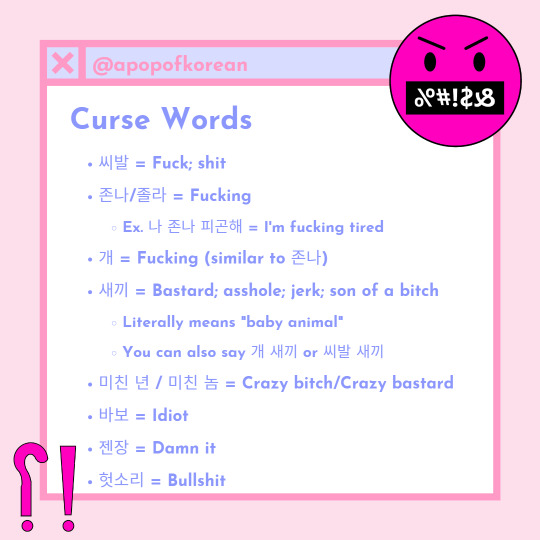
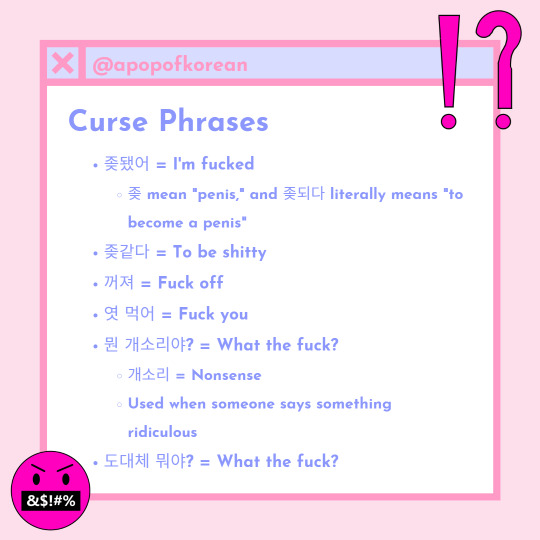
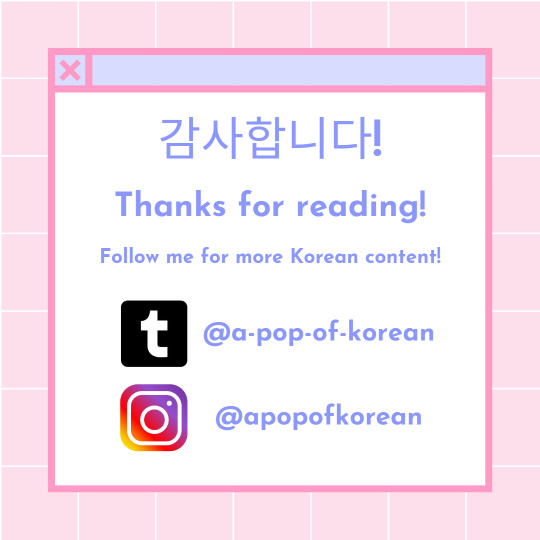
My masterlist
Join my Discord chat here to practice Korean with others!
Follow me on Instagram here for more Korean content!
Get Drops Premium using my affiliate link to expand your Korean vocab!
Check out my Ko-Fi to support this blog and my studies! Thank you for your generosity!
#korean#korean language#korean vocabulary#korean vocab#study abroad#learn korean#learning korean#study korean#studying korean#korean culture#유학#유학생활#한국#한국 문화#어휘#한국어#한국어 공부하기#한국어 배우기#langblr#korean langblr
478 notes
·
View notes
Text
Korean Slang을 좀치네요~
A casual phrase that was been around for a while
뭐뭐.. “좀 하다”
“Done a bit of this / Dabbled in / Done this a bit in my day”
Simply put, it is a playful way of saying someone has done something quite a bit or is pretty good at something. Which is why it’s generally used with the ~네(요) or 거든(요) grammar endings.
For example
“야 너 롤 해??”
“Do you play LoL (League of Legends)?”
“응, 나 좀 하지”
“Yeah, I play a bit”
But this has changed from 하다 (To do) to 치다 (To play a sport or instrument) but still can be used in everyday context.
So instead of saying “너 베이킹 잘 하네!”
“You’re pretty good at baking!”
You can say
“와아, 이 빵 잘 구웠네. 너 좀 치��”
“Woah, you baked this bread so well. Guess you’re pretty good at baking”
As always, it’s not a direct translation, but you get the gist of it.
이제 구독자분들도 한국어를 좀 치시네요~
(Now you (the readers) know a bit of Korean too)
#korean#한국어#한국어 공부#studyblr#한국어배우기#learning korean#learn korean#slang#korean language#korean slang#language#kpop#korean vocabulary#south korea#seoul
310 notes
·
View notes
Text
Korean Homonyms_차다







Here's the link to our instagram post.
#learn korean#study korean#korean vocab#korea#korean#한국어#한국어 공부#한국어 배우기#language#Korean Vocabulary#vocabulary#homonyms
16 notes
·
View notes
Text
V - Love Me Again (lyrics+vocab)

Oh, love me again I wish you could Love me again
추억도 의미 없이 내게 넌 사라지고 이쯤에도 I can't let you go, let you go 그 말이 다인 거니? 한마디만 남기고 후회하면 won't you let me know, let me know?
▸ 추억 - memories ▸ 의미 없다 - to be meaningless ▸ 사라지다 - to disappear ▸ 이쯤 - right about now ▸ 후회하다 - to regret
그래, 나 솔직하게 다 말할래 너는 매일 어떤 사람 어떤 곳에 몇 번씩이나 뭘 하는지 널 생각해 Lost without you, baby
▸ 솔직하게 - honestly ▸ 말하다 - to tell, say ▸ 매일 - everyday ▸ 몇 번씩 - many times ▸ 생각하다 - to think (about)
I wish you would love me again No, I don't want nobody else I wish you could love me again, again I wish you would love me again No, I don't want nobody else I wish you could love me again, again
나만 자꾸 이런 건지? 내 옆에 딴 사람 괜찮니? 예전으로 천천히 Make it feel better, yeah, make it forever 괜찮다 말하지 마 Said I'm alright, said I'll be fine I'm sorry 거짓말이야 떠나지마, 저리 가지마 멀리
▸ 자꾸 - all the time ▸ 예전 - before, the past ▸ 천천히 - slowly ▸ 거짓말 - lie ▸ 떠나다 - to leave ▸ 멀리 - far
73 notes
·
View notes
Text
ART HISTORY WORD LIST
I'm slowly reading a book called 청소년을 위한 한국미술사 (Korean Art History for Youth). In the process I came across many interesting terms that may be useful for those who are interested in Korean art and history and maybe would like to read about such topics in Korean in the future. So I decided to share the vocabulary list. Perhaps, to be continued.
선사 [先史] - prehistory
도안 [圖案] - design
암각화 [巖刻畵] - petroglyphs
청동 [靑銅] - bronze
빗살무늬 토기 - comb-pattern pottery
유물 [遺物] - relic, artifact
미의식 [美意識] - aesthetic sense
창의력 [創意力] - creativity
삼국 시대 [三國時代] - Three Kingdoms of Korea
불교 [佛敎] - Buddhism
부처의 현신 [現身] - the Buddha who appeared in the form of a famine in order to save sentient beings
소재 [素材] - material
국교 [國敎] - established religion
강대국 [强大國] - (world) power, powerful nation
학술 [學術] - scholarship
석총 [石塚] - stone grave
석실봉토무덤 [石室封土무덤] - stone-filled tomb
기원전 [紀元前] - B.C. (Before Christ): 기원전 50년 - 50 B.C.
고고학 [考古學] - archaeology
묘제 [墓祭] - a memorial service held before the grave
전기 [前期] - the former part
평면도 - ground plan (architecture)
초상화 [肖像畵] - portrait
고분벽화 [古墳壁畫] - ancient tomb mural
사당 [祠堂] - shrine
신주 [神主] - ancestral tablet
경외감 [敬畏感] - sense of awe
환희 [歡喜] - (great) joy, delight
전달력 [傳達力]- transmission
구체적 [具體的] - detailed
기인하다 [起因하다] - result from
순수 [純粹] - purity
공예품 - handicraft, craftwork
문화재 [文化財] - cultural properties
보관 [保管] - storage
걸작 [傑作] - masterpiece
보고 [寶庫] - repository
청자 [靑瓷] - celadon
극치 [極致] - the height (of)
영토 [領土] - territory, domain
만주 [滿洲] - Manchuria
수나라 [隋나라] - Sui Dynasty
당나라 [唐나라] - Tang Dynasty
명장 [名將] - great commander
저항하다 [抵抗하다] - resist
패망하다 [敗亡하다] - collapse

#korean#word list#korean vocabulary#korean language#langblr#learning languages#language study#foreign languages#language blog#korean word of the day#hangul#hanja#korean history#korean art#한국어#한국미술사
87 notes
·
View notes
Photo

If you're learning Korean, you might have encountered the word "어차피" (eo-cha-pi) at some point. It's a useful word that can be translated to "anyway," "in any case," or "after all." When you use "어차피," you're often indicating that something is inevitable or necessary, regardless of other circumstances. To use "어차피", you simply need to add it to the sentence. E.g. 어차피 늦었으니까 천천히 와. (It's late anyway, so take your time.) 어차피 다른 선택지가 없어. (There’s no other option anyway.) 그 사람은 어차피 나를 싫어하는 거야. (That person hates me, after all.) "어차피" is often used with grammar like ~(으)니까 or -(으)ㄴ/는데 to add more context. E.g. 어차피 해야 할일이니까 빨리 하고 끝내는게 좋지않겠어요? (Because it's something you have to do anyway, isn't it better to hurry up and finish it?) 어차피 시간이 없는데 일찍 가는 게 좋을 거야. (Anyway, since we don't have much time, it's better to leave early.) 어차피 지나간 일이니까 다시 말하지 말아요. (Since it's a thing of the past anyway, let's not talk about it again.) 어차피 밖에 비가 내리고 있는데 조금더 이야기를 나누자 (It's raining outside anyway, so let's talk a little bit more.)
🌸 🌼 🌻
Support me at: https://koreanlanguageloving.my.canva.site/
#Korean Language#korean langblr#Learn Korean#Study Korean#Hangul#한국어 공부하기#한국어 배우기#한국어 어휘#한국어 연습#한국어#한국어능력시험#한국어공부해요#한국어공부중#한국어공부하기#한국어공부#Korean Vocabulary
395 notes
·
View notes
Text
Word Of The Day - DOG
pes (m)
(Czech)
.
chien (m)
(French)

hond (m)
(Dutch)
.
perro (m)
(Spanish)
.
개
(Korean)

ʻīlio
(Hawaiian)
.
cane (m)
(Italian)

#word of the day#langblr#czech#french#dutch#spanish#korean#hawaiian#italian#czech vocabulary#french vocabulary#dutch vocabulary#spanish vocabulary#korean vocabulary#hawaiian vocabulary#italian vocabulary#vocab#vocab list#vocabulary#vocabulary list#czech langblr#french langblr#dutch langblr#spanish langblr#multilingual#language#polyglot#studyblr#dutch language#languages
15 notes
·
View notes
Text
Vocabulary 직업
직업 - occupations
가수 - singer
간호사 - nurse
경찰 - police officer
공무원 - government employee
과학자 - scientist
교수 - professor
군인 - military personnel
기술자 - technician
기자 - reporter, newspaperman
농부 - farmer
님 - sir, ma’am (honorific form)
배우 - actor, actress
변호사 - lawyer
비서 - secretary
승무원 - flight attendant, crew
우체부 - mail carrier, postman
은행원 - bank employee
의사 - doctor
주부 - housewife
직업 - job, occupation
화가 - artist, painter
#korean#korean vocabulary#vocabulary#korean vocab#south korea#south korean#korea#language#language learning#korean language#korean langblr#langblr#study#korean studyblr#studyblr#learning#learn#studying#tesol#tesl#tefl#korean culture#teaching
18 notes
·
View notes
Text
231212 Vocab
반추: rumination, reflection 어떤 일을 여러 번 계속하여 생각함. 또는 그런 일. The act of constantly thinking about a matter, or such a matter.
역이용하다: turn something to one's own advantage; turn something against itself 어떤 목적을 가지고 있는 것을 그 반대의 목적으로 이용하다. To use something for a purpose opposed to its original purpose.
어여쁘다: beautiful, lovely (옛 말투로) 예쁘다. (old-fashioned) Pretty.
이치: reason, principle, sense 정당하고 도리에 맞는 원리. 또는 근본이 되는 목적이나 중요한 뜻. A right principle consistent with reason, or underlying purpose or significant meaning.
일구다: create 어떤 현상이나 일 등을 일으키다. To cause a certain phenomenon, matter, etc.
공통분모: common denominator, something in common (비유적으로) 여럿 사이에 서로 같은 점. (figurative) A common point among different people.
궁핍: being poor 물질적으로나 정신적으로 가난하고 여유가 없는 상태. The state of being materially and mentally poor.
허술하다: shabby; humble 낡고 헐어서 보잘것없다. Being old and worn out, making it look worthless.
탁상공론: desk theory 실제로 이루어질 가능성이 적은, 헛된 이론이나 논의. An impractical theory or discussion, whose possibility of coming true is low.
도출: inference 어떤 일에 대한 생각, 결론, 판단 등을 이끌어 냄. The act of deriving a thought, conclusion, decision, etc., about something.
구현: embodiment, materialization, realization 이념이나 사상, 계획 등을 구체적인 모습으로 나타나게 함. Making an idea, thought, plan, etc., appear in a concrete form.
#한국어#한국어 공부#공부계#한국어 공부하기#한국어 배우기#new vocab#studyblr#study korean#learning korean#korean#korean vocabulary#south korea#korean language#learning languages#language#langblr#language study#language learning#korean learning#tumblog#tumblr blog#learning#노트정리#공블러
99 notes
·
View notes
Text
Hi guys! It’s been a VERY long time since I last posted but I return with some exciting news !!
I sent in my EPIK application today!! I’ve finally applied to teach abroad in Korea !
15 year old me would be in disbelief that I’ve finally made the plunge! It honestly just feels surreal.
I’m gonna post updates about my journey as it unfolds!! Please stay tuned ☺️
#korean language#korean langblr#korean#langblr#korean study blog#korean vocab#study#korean vocabulary#EPIK#teaching in korea#TEFL
10 notes
·
View notes
Text
Hanja Lesson: 후
안녕하세요 여러분! This week's lesson is a Hanja one, this time a little but about 후! You can find this lesson on my Instagram here as well. I hope it's helpful :) Let's start!

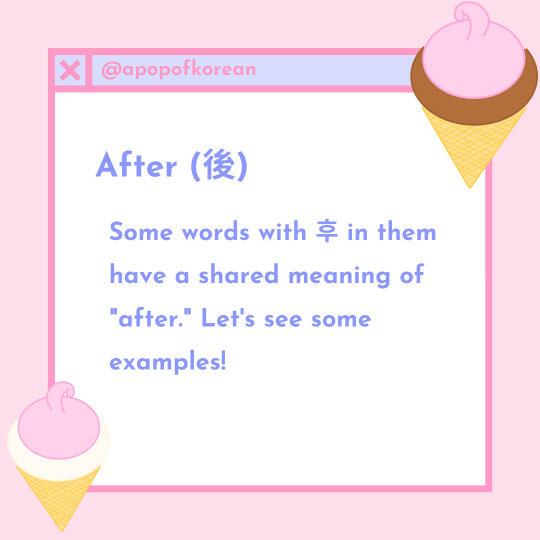


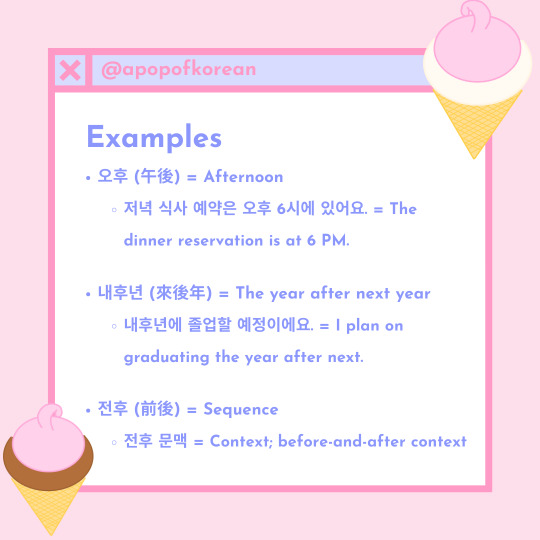

My masterlist
Join my Discord chat here to practice Korean with others!
Follow me on Instagram here for more Korean content!
Check out my Ko-Fi to support this blog and my studies! Thank you for your generosity!
#korean#korean language#langblr#korean langblr#study korean#studying korean#learn korean#learning korean#apok#korean vocab#korean vocabulary#hanja#hangul#한국어#한글#한자#한국어 배우기#한국어 공부하기#어휘#단어
100 notes
·
View notes
Text
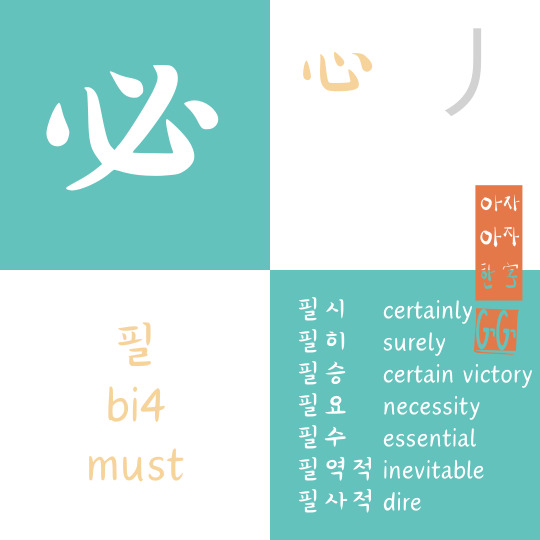
必 bi4 필
if you'd like to support me, check out my ko-fi!
character story:
It is necessary to follow your 丿일 one and only 心 심 heart to live a happy life.
Study vocab here!
Vocab:
필시 Certainly
필히 Surely
필승 Certain victory
\필요* Necessity
필요하다 to need (I need, we need, etc)
필요있다 to be necessary
필수** Being essential
필수과목 required course
필수조건 essential condition
필수품. Necessities
필연적. Inevitable
필사적 Desperate/dire
#5lvl#family: heart#필#bi4#alt:#korea#korean#korean language#korean learning#hanja#korean study#study korean#korean vocabulary#korean langblr#hanja vocab#hanja vocabulary#korean vocab#langblr#language#chinese characters#studyblr#original#ajaajahanja
66 notes
·
View notes
Text
Vocabulary_해양 생물 Marine Life






Here's a Korean vocabulary list on marine life!
Here's the link to the original instagram post.
#learn korean#study korean#korean vocab#한국어#한국어 공부#한국어 배우기#korean#language#vocabulary#korean vocabulary
11 notes
·
View notes
Text
Agust D - Amygdala [lyrics+vocab]

I don't know your name I don't know your name, yeah I don't know your name 요즘 기분은 어때? I don't know your name, your name, your name 기억들로 여행 지우고픈 일들 요즘 기분은 어때, 어때, 어때?
▫ 요즘 - lately ▫ 기분 - mood ▫ 요즘 기분은 어때? = How have you been feeling lately? ▫ 기억 - memories ▫ 여행 - travel, trip ▫ 지우다 - to erase 지우고픈 일들 = 지우고 싶은 일들 = Things I want to erase
천구백구십삼 내가 태어난 달 엄마 심장의 수술, 수술, 수술 별의별 일이 많았지 뭐가 이리 다사다난한지 기억조차 안 나는 기억도 다 꺼내 보자고 하나씩 다 꺼내 보자고 하나씩
▫ 태어나다 - to be born ▫ 달 - month ▫ 심장 - heart ▫ 수술 - surgery ▫ 별의별 - all kinds of, various ▫ 다사다난하다 - to be eventful ▫ 꺼내다 - to take out ▫ 하나씩 - one by one
최선들의 선택 다음 차선들의 선택 차차 선들의 선택, 선택, 선택, yeah 원치 않던 일들 내 통제 밖의 일들 자 집어넣자 하나둘 그래 하나둘, 그래 하나둘
▫ 최선 - the best ▫ 선택 - choice, decision ▫ 차선 - the second best ▫ 원하다 - to want ▫ 통제 - control ▫ 밖 - outside, out of ▫ 집어넣다 - put sb into, throw sb into
I don't know your name, your name, your name 기억들로 여행, 여행, 여행 I don't know your name, your name, your name 자 지워보자 하나씩, 그래 하나씩
My amygdala (My amygdala) 어서 나를 구해줘 어서 나를 구해줘 My amygdala (My amygdala) 어서 나를 꺼내줘 어서 나를 꺼내줘 My amygdala (My amygdala) My amygdala (My amygdala) 이곳에서 구해줘 어서 빨리 꺼내줘, yeah, yeah
▫ 어서 - hurry, fast ▫ 구하다 - to save ▫ 이곳 - this place, here ▫ 빨리 - fast
Uh-uh, 그래 참 별의별 일이 많았지 Uh-uh, 귓가엔 엄마 심장 시계 소리 Uh-uh, 전하지 못했던 내 사고 소식과 스케줄 중에 걸려 온 전환 아버지의 간암 소식 (Woah-oh) 최선의 선택들이 맞았었길 (Woah-oh) 그 또한 모두 지나가 버렸기에 그래서 이 수많은 고통은 날 위한 것일까 끊임없던 시련은 날 죽이지 못했고 다시금 나는 연꽃을 피워내
▫ 귓가 - around my ears ▫ 엄마 심장 시계 소리 - the sound of the clock in my mom's heart ▫ 전하다 - to convey ▫ 사고 - accident ▫ 소식 - news ▫ 스케줄 - schedule ▫ 전화가 걸려오다 - to get a phone call ▫ 간암 - liver cancer ▫ 맞다 - to be correct ▫ 지나가다 - to pass ▫ 고통 - pain ▫ 끊임없다 - to be ceaseless ▫ 시련 - ordeal, hardship ▫ 죽이다 - to kill ▫ 다시금 - again ▫ 연꽃 - lotus ▫ 피우다 - to bloom
152 notes
·
View notes